Highlights:
- Poor psychological health leading to physical illness (psychosomatic illness) has been known since centuries.
- Very little research data available on the role of psychological distress in cancer deaths.
- This large prospective cohort study looks at the association between psychologic distress and cancer deaths.
Reason for the Study
- Very little published data is currently available on the association between psychological health and cancer.
- The few prospective studies that have attempted to do so are small in size and have thrown up widely differing results ranging from positive, neutral and negative associations.
- Some of the earlier studies have not explained satisfactorily, the confounding factors that could affect the results such as socioeconomic status, risky health behavior and systemic inflammation.
Setting of the Study
Participants for the study were chosen from nationally representative samples from the health survey of England (13 studies) and the Scottish health survey (3 studies). The participants included 163,363 men and women aged 16 or older at the start of the study, who were cancer free to begin with, provided self-reported poor mental health scores (based on the general health questionnaire, GHQ-12) and agreed to linkage of their health records.Based on the questionnaire to assess psychological distress, the participants were subdivided into 4 groups for comparison namely:
- Asymptomatic (score 0),
- Sub-clinically symptomatic (1-3)
- Symptomatic (4-6)
- Highly symptomatic (7-12).
To remove effect of reverse causality, i.e. presence of cancer-causing psychological distress, persons who had cancer initially and those who died within the first 5 years of follow-up were excluded from the study.
What the Study Found
- Persons who were highly distressed had higher death rates from specific cancers compared to minimally distressed persons.
- The strongest associations were found for carcinoma of the colorectum, pancreas, prostate, and esophagus and for leukemia.
- Interestingly, for cancers of the prostate and colorectum, a gradient was seen i.e. the greater the degree of distress, the higher the mortality rates, partially supporting a causal influence hypothesis.
- Except for lung cancer, where smoking is known to have a risk association, the hazard ratios of stress in the causation of cancers was found to equal the magnitude of smoking and obesity for selected cancers.
Suggested Mechanisms How Stress Might Lead to Cancer Deaths
The effect of stress on cancer could be related to causation (etiology) or survival (prognosis). Additionally, these effects can be direct (biological) or indirect (behavior related) and could be responsible for specific cancers and/or multiple cancers. These mechanisms include the following.- Prolonged stress can cause disordered immunity and as a result affect tumor protective responses leading to causation of cancer.
- Immune dysregulation has been known to cause a more unfavorable outcome in cancers such as cancer of the colorectum, stomach, lung, and mesothelium.
- Stress has been found to increase hormone-related cancers such as prostate and ovarian cancers, possibly by disruption of the hypothalamic pituitary adrenal (HPA)and sympathetic adrenal medullary (SAM) axes.
- Stressed persons are more likely to indulge in excessive smoking or alcohol intake and lead a sedentary life, all of which might increase cancer risk. However, this study made due adjustments for these factors during analysis.
- Stressed individuals might possibly delay seeking medical attention or be irregular with treatment, resulting in a poorer outcome.
Merits and Demerits of the Study
- The chief merits of the study included the usage of raw unpublished data of the general population and using a large and well-defined population sample.
- Possible limitations include the short reference period of four weeks to assess the mental status, though this was done on four separate occasions.
- The specific cancer outcomes analyzed in the study were not hypothesis driven.
- Presence of confounding factors is a strong possibility in observational studies such as this.
Conclusions from the Study
This study offers additional evidence that psychological stress could increase death rates from cancer.The authors suggest that while using multifactorial algorithms to assess the risk of causing disease such as cancer, psychological stress must also be employed as a component, which is currently not the case. Assessing these collective risk factors will have better predictive value regarding the outcome.
Further research is necessary to establish a causal association between psychological distress and cancer.
- G David Batty, Tom C Russ, Marjorie MacBeath, Emmanuel Stamatakis,Mika Kivimäki, 'Psychological distress in relation to site specific cancer mortality: pooling of unpublished data from 16 prospective cohort studies' BMJ 2017; 356 doi: https://doi.org/10.1136/bmj.j108















